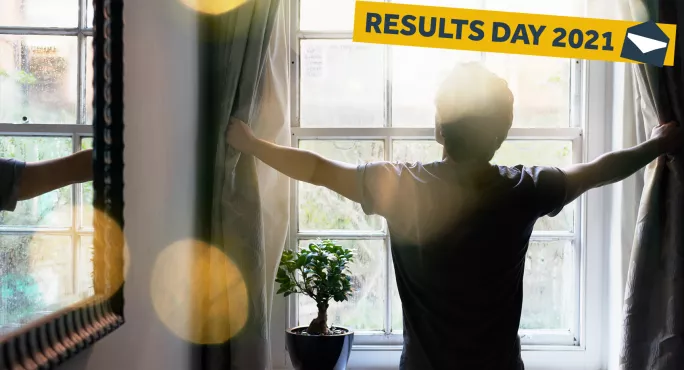- Home
- Teaching & Learning
- Secondary
- Scottish results day 2021: Brighter days lie ahead
Scottish results day 2021: Brighter days lie ahead

SQA results day 2021 is looming and, after the 2020 fiasco, it feels all too easy for secondary teachers in Scotland to experience a sharp heart palpitation (or in my case, the occasional involuntary yelp) at the very thought of 10 August. Regardless, after a restful summer, I am now reflecting on the past year or so in the hopes of stumbling upon a healthier way of thinking about the ordeal we’ve all been through - and of the brighter days ahead.
I must surely speak for many teachers when I say this: I’m knackered. On top of the normal demands of teaching, many of us spent most of the 2020-21 academic year worrying on an unhealthy level about our senior classes. In my darkest moments, I would lose sleep over the mammoth task of delivering equitable courses while classes were being more than halved by self-isolation requirements.
I found it difficult to fight back tears of sadness and pride at the sight of my senior pupils tackling their “non-exams” with dignity, determination and composure. If ever there was a decent summer earned, then truly for staff and pupils alike, it happened this year.
SQA results 2021: How we got to SQA results day 2021
SQA and the pandemic: SQA boss on exams turmoil and 18 months of Covid
SQA results day 2021: 5 things to look out for
Analysis: Is teacher judgement of 2021 grades really being trusted?
Flashback to May: Exam questions shared on TikTok ‘SQA black market’
Key findings: Priestley review of the 2020 SQA results fiasco
And at the end of it all, there’s no real excitement for results day this year - it’s more of a confirmation day than anything else. Gone is the simultaneously exhilarating and excruciating anticipation for pupils and teachers alike. Gone (presumably), are the hordes of teens setting a rare early morning alarm in order to catch the postie. Indeed, if the Scottish Qualifications Authority (SQA) sticks to its promise of not fiddling with teacher estimates, then the only damage inflicted by those certificates is likely to be paper cuts than horrendous surprises.
With the dust now settled and the SQA envelopes already in the post, I’m starting to realise that my dark moments of 2020-21 were just that: moments. With the benefit of distance and hindsight, I now recognise that I have gained an awful lot from the past 18 months, including a sense of how we can prosper in the aftermath of all the Covid trauma.
For starters, let’s ditch exams already. At the very least, let’s put far more weight on coursework and more confidence in teacher judgement. I know this is a controversial opinion, but I struggle to accept that such a gargantuan chunk of a child’s attainment should be determined by one horrifically stressful day. Education shouldn’t operate like a penalty shootout, where one wrong move overshadows an entire season of impeccable playing. For all of the stress of moving goalposts and the exam cancellations of 2020-21 (and the year before), I liked our certification model this year: with some polish, I believe it could bring about a fairer and more compassionate system.
Most importantly, 2020-21 has shown me that if nothing else, all schools must embrace, live and breathe nurture principles. This simply cannot be confined to schools in high-ranking SIMD (Scottish Index of Multiple Deprivation) areas. Whereas we have all embraced the summer holidays with a justified sense of relief, we are kidding ourselves if we believe that Covid trauma is a thing of the past - its legacy is likely to be felt for years to come. Shouting at, belittling and embarrassing young people must be confined to the history books.
I am no poster-boy when it comes to this, as I only recently completed a nurture principles training course. But I am learning every day and, as a result, I am becoming a better teacher. If nurture principles become the norm, I truly believe that in years to come we will see increasing numbers of young people ripping open their certificate envelopes with glee and not dismay on results day.
In an era where compassion and empathy are too often ridiculed by the right-wing press as “wokeness gone mad”, it is with urgency that we must espouse these values if we are to not just heal from Covid - but to truly and fundamentally improve our approach to education in Scotland.
Glen Fraser is a secondary teacher in Scotland
Register with Tes and you can read two free articles every month plus you'll have access to our range of award-winning newsletters.
Keep reading with our special offer!
You’ve reached your limit of free articles this month.
- Unlimited access to all Tes magazine content
- Save your favourite articles and gift them to your colleagues
- Exclusive subscriber-only stories
- Over 200,000 archived articles
- Unlimited access to all Tes magazine content
- Save your favourite articles and gift them to your colleagues
- Exclusive subscriber-only stories
- Over 200,000 archived articles
topics in this article



